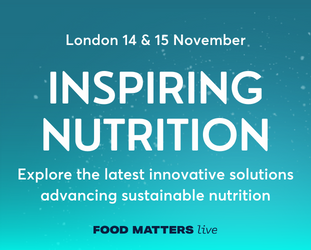Nutrition in older age: keeping healthy and avoiding malnutrition

As a forty-something, exercise is a top priority for me and I put much more thought into what I eat and drink now than I did when I was in my twenties. But is that enough as I get older? Have you ever wondered how much healthy lifestyle habits and good nutrition influence our ability to age well and how they will impact us in older age? Our bodies change inside and out, but how exactly might our eating habits, taste preferences, and nutritional needs adjust?
Existing advice for older people just isn’t specific enough according to the Association of UK Dietitians. “We need to make sure that we’re giving people the right sort of information. We don’t yet have appropriate dietary recommendations – it’s too generalised,” explains Jane Murphy, a Registered Nutritionist, Dietitian and Professor in Nutrition who co-leads the Ageing and Dementia Research Centre at Bournemouth University. More research is required, and there’s no single best diet for over-55s. She’s calling for a more individualised approach that takes into account someone’s genetic predisposition to certain conditions as well as their lifestyle and socio-economic environment.
Having a nutritious, balanced diet from a young age can help protect against health issues in older age and this ‘life-course approach’ encourages optimising health long before any unexplained weight loss, mobility problems or cognitive diseases develop. So midlife can be an ideal time to make some key changes that could potentially delay the onset of serious age-related conditions. It’s also an ideal chance to find out about some of the warning signs and learn about how best to enable others to continue enjoying food throughout later life.
The weight loss myth
One of the most common misconceptions is that as we age, we naturally lose weight. But Murphy insists that this isn’t an inevitable part of the ageing process. “Weight loss impacts muscle strength, digestion, swallowing and mobility,” she says. “If anybody is losing weight unintentionally, that should be a huge red flag.” Murphy suggests this is sometimes an early indicator of dementia or cancer. She says that once individuals and their relatives, caregivers and medical professionals are better equipped to spot the symptoms and deliver early intervention, dietary needs can be fulfilled in a really person-centred way.
Marriyah Hasan, who works for the NHS as a Specialist Medical Dietitian, says that many of her hospital patients assume they don’t need to eat much because they’re not very physically active. “But your body still requires those nutrients to function properly, and if we make sure that our older people maintain good nutrition, they can remain independent for much longer,” she highlights.
“From around our 40s and 50s, we all start to lose our muscle mass, so it’s important that at this point of life, we focus on what’s good for us, making sure we have good physical activity, good healthy balanced diet, cutting down on alcohol, smoking, processed foods, making sure we’re having lots of protein, micronutrients, taking vitamin D and eating a good source of calcium,” advises Hasan, who explains that as we age, overall energy intake may reduce, but protein requirements remain the same. “You’re actually breaking down more muscle than when you were younger, but your energy requirement is lower…so that means you need a lot more protein in your diet to maintain muscle.” She warns that often the focus moves to getting more calories in but if that’s just an increase in fat and energy, it won’t necessarily be healthy and balanced.
Academics like Murphy are starting to investigate the best ways to ensure that nutrient density is maintained within meals and snacks, even as someone’s appetite decreases. She outlines that there’s a strong consensus that a ‘food first’ approach is best, with nutritional supplements as a last resort. However, Hasan adds that having a good supply of HMB, a metabolite of the protein leucine, can reduce your muscle breakdown and help its growth so supplementary nutritional drinks containing HMB could possibly help reduce severe loss of muscle mass in older people.
Of course, a protein-rich diet isn’t always easy to achieve, especially for people who don’t have proper fitting dentures, find cutting certain foods tricky, or find it hard to swallow. Losing the ability to swallow – dysphagia – is linked to loss of muscle mass and strength because when overall muscle function becomes poor, the muscles involved in swallowing can’t work as well as they used to. People with dysphagia need a texture-modified diet, but blended foods won’t always be as nutrient-rich if mixed with water – if possible, foods need to be blended with milk or yogurt. Ideally, one should blend foods individually (rather than making an entire meal into a smoothie) and present them using moulds to create a colourful and appealing plate. Dysphagia is an increasingly prevalent condition in older people and once eating becomes so much more difficult, nutritional intake becomes even more limited. It’s a downward spiral.
The perils of malnutrition
Eating less and losing weight can both be precursors to malnutrition, a serious health issue that isn’t uncommon in older people, says Hasan. “As people get more frail, then it’s a vicious cycle, their strength is reduced, their walking ability is reduced. They can’t cook or prepare food, so it’s harder to eat a healthy diet, then they continue to get more frail.” That impacts everything from immunity to skin health so you might be at greater risk of infection and more prone to developing pressure areas. One study found that malnourished people saw their GP twice as often and had three times the number of hospital admissions. Another study of more than 6,700 Dutch care homes found that malnourished residents fell more often and that nutritional intervention lowers fall risk.
Lesley Carter, Clinical lead at Age UK and Head of the Malnutrition Task Force works with the charity BAPEN and other organisations to raise awareness about ways to avoid preventable malnutrition, something that she says has been overlooked for years. “The issue is about getting the right type of food from the plate to the mouth,” explains Carter who points out that some older women might have been on a diet their whole life and need more fat intake. “We’re trying to educate people that it’s not just about the five a day, it’s about eating what’s good for you now.” She has also noticed that many older people have been ‘deconditioned’ through COVID: “They’ve lost their mobility, access to shops, and some people aren’t in a fit state to cook because they’re finding standing or chopping really difficult. So we see that people are eating less – one in 10 people are at risk of malnourishment in the community.”
Hasan recommends following the ‘colourful’ Mediterranean diet or the principles of the Government’s Eat Well guide. Recent research from Dr Oliver Shannon, a Lecturer in Nutrition and Ageing at Newcastle University, found that eating a Mediterranean diet is associated with up to 23% lower risk of dementia in a sample of over 60,000 older adults in the UK. The MIND diet, low in sugar and fried foods, but rich in nuts, berries, legumes and olive oil, has been designed to help prevent dementia and slow the decline in cognitive function that happens as we age. One small study by researchers at the University of Oxford indicated that taking daily high-dose tablets of certain B vitamins (B6, B12 and folic acid) can potentially reduce the amount of brain shrinkage in people over 70 with mild memory problems, but before you go and buy over-the-counter B vitamin supplements, more research is needed.
Murphy emphasises that dietary recommendations need to be translated accurately and customised for a really diverse population. “[We need to] take the principles and adapt it. That literacy and communication is so crucial. So we need to work together and co-create with people in our research so we have outputs that are well-designed for the people who need them.”
Sensory and social solutions
“As we age, our functional capacity and capability can worsen,” explains Murphy. “We might lose the ability to sense the smell of food, we can’t see as well – our senses deteriorate. In conditions like dementia that tails off very quickly with all sorts of changes. So it’s about maintaining that health for as long as possible, recognising what might happen and knowing that everyone is different.”
People with dementia can experience changes in their food preferences – they might start liking stronger flavours or sweeter foods, for example, yet they could become less able to sit and concentrate on one meal for a long period of time, so healthy finger foods – rather than typical party food – that they can snack on through the day could work better for some.
Hasan says visual cues become increasingly significant: “Attractive, colourful food is important. In the hospital, we have moved from white plates to blue plates because food such as mashed potato, fish in sauce and roast chicken, shows up better than white on white and more gets eaten.” Some creative care homes have set up coffee shops and cafés offering fortified milkshakes to engage their residents with food in a fun, sociable way.
Beyond clinical settings, there’s plenty that can be done to support older friends and relatives at home too. Helping someone to get outside on a daily basis positively impacts their vitamin D levels, which can improve bone function, mobility and can lower the risk of falls. Perhaps speaking to healthcare professionals to minimise the complex side effects of multiple medications or polypharmacy, as Hasan outlines, can have a ‘huge impact’ on how an older patient is managing.
Hasan recommends sitting and eating with someone on a regular basis to help encourage older people to enjoy their mealtimes and stimulate them socially while they eat too. “Interacting with others has a positive impact, so with someone who has dementia for example, you can encourage them, give them the right cutlery, see what they can eat – that can make a huge difference,” she says.
So many health issues are exacerbated by isolation so finding ways to connect with others in the community, cook and eat together is an incredibly empowering step to maintaining healthy eating habits, especially in the midst of the cost-of-living crisis. That might involve joining a weekly casserole club, memory café, or even sign up to cookery classes. Age UK runs a project in London called the Kitchen Kings to help older men learn to cook wholesome food for the first time in their lives.
“I’ve learnt a lot through the power of food and how it brings us together,” says Murphy. “When you don’t have that, life can be pretty rubbish. Maintaining that enjoyment of food, while meeting people’s needs, is so important.”
10 ways to eat well and age well
- If you start losing weight or notice dentures become loose for example, ask for medical advice
- Drink plenty of water to stay hydrated (preferably 1500ml daily, more during hot weather)
- Eat varied foods from the Eat Well plate, especially plenty of protein, such as eggs or oily fish
- Choose tasty, nutrient snacks that you enjoy, such as fruit and yogurts
- Get outside whenever possible to help boost your vitamin D levels
- Stick to regular yet flexible mealtimes that work for you – use reminders if necessary
- If you cough and splutter when you eat, consult your GP about swallowing issues
- For people with dysphagia, present texture-modified foods in an appetising way. Visit diningwithdignity.co.uk for ideas
- Check out the Age UK website to connect with your local community through food
- Support friends and relatives with dementia by downloading this Eating and Drinking Well with Dementia toolkit









